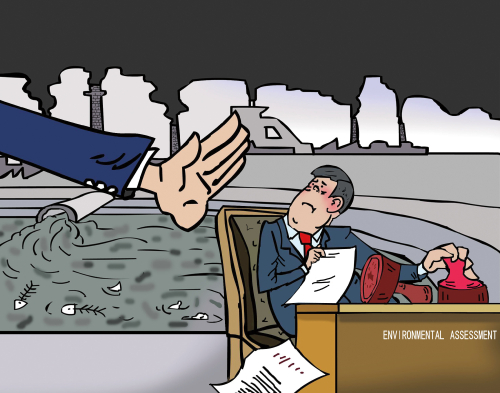|
 |
|
(LI SHIGONG) |
Newly appointed Environmental Protection Minister Chen Jining said at a press conference on March 7 that eight environmental assessment agencies under the public institutions affiliated to the Ministry of Environmental Protection (MEP) would become totally independent of the ministry this year, and that the initiative would also be extended downward to local levels.
In theory, these agencies are supposed to remain impartial and objective in the production and distribution of environmental impact assessment findings for various projects. However, owing to their close kinship with environmental authorities, which decide whether or not a project is granted approval, the agencies are becoming increasingly targeted by certain businesses as a means of getting what they want through unsavory practices such as bribery. As a result, the validity of assessment findings has increasingly been called into question.
Most people believe that building a figurative wall to divide these assessment agencies and environmental authorities, thus making the former independent in the real sense of the word, would help give a boost to the public perception of environmental assessment findings. Meanwhile, others claim that this alone would not be sufficient in guaranteeing the efficacy and authenticity of the assessment work. Many maintain that the assessment process must also be made more transparent and furthermore, that more public involvement in monitoring and supervision should be encouraged.
Reining in malpractices
Liu Bai (Beijing Times): Given their position at the frontline of the war on pollutant practices, the significance of assessment agencies is obvious. If corrupt behavior is allowed to slip through any cracks present in this front, no matter what measures are taken to compensate, the scale of the ensuing ecological and financial damage is immeasurable, not to mention the undermining of public trust in the government. The MEP must take decisive action to rein in the endemic problems in this vital area.
Some state-run institutions, associations and centers that operate under the auspices of certain government departments have long been complicit in activities that interfere with the market. Some have even benefited, financially or otherwise, from such activities. This is in clear contradiction of the spirit of the reform aimed at making clear the distinction between the government and the market. With respect to businesses, such organizations act as the government's spokesman, and carry out essential formalities and duties such as the assessment of good practices and the awarding of accolades. To the government, they act as operational units and lobbyists. If one is ethically malleable, there is doubtless much to be gained in both capacities, and corruption thus arises. Separating these organizations from environmental authorities will effectively remove these temptations and make it impossible for such illicit activities to occur in the field of environmental assessment.
Wei Yingjie (Xinmin Evening News): For so many years, environmental authorities have proved themselves impotent in dealing with environmental issues. It has been suggested that environmental watchdogs need to be granted even more power so that they can launch robust campaigns against pollution and remedy various environmental issues.
Backed up by the newly amended Environmental Protection Law, China's environmental authorities are more capable today than ever before. However, plagued as they are by various issues concerning environmental assessment, if they do wish to have greater impact in tackling environmental problems, they also must possess the resolve to cut ties with all kinds of interest groups that might impugn the veracity of assessment results. Clearly separating assessment agencies from their affiliated environment authorities means minimizing, or even extinguishing, the possibility of findings being unduly influenced, which may otherwise in turn lead to the proliferation of illegal practices and the potential infliction of huge damage to the environment.
Assessment agencies are on the front of the war against environmental pollution. However, in practice, the operations of these agencies have been revealed to be a bit of a mess. Some of them can no longer be called impartial and objective entities with a straight face. This is because instead of pursuing the aforementioned qualities, the members of some agencies have been involved in the pursuit of their own interests and profit margins. This opens the door for their cronies in the business world to influence the results of assessments--that is, as long as they can come up with the appropriate amount of money. On the state-owned side of things, the assessment process is even interrupted or stalled owing to interference from environmental authorities, and inaccurate assessment findings are hence released.
In the face of severe environmental pollution urgently in need of being addressed, swift and efficient action is needed. The public should also be accorded a role in monitoring whether or not authority is being abused and they should have involvement in the nuts and bolts of the assessment process, so as to ensure inappropriate relationships between environmental authorities, assessment agencies and the market can no longer be maintained. Without public supervision, it will remain possible for under-the-table transactions and all manner of corrupt practices to continue unabated. The imposition of effective restrictions on authority has become a key component in the drive to correct illicit activities in environmental assessment.
| 